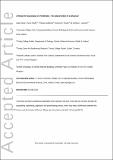Files in this item
A recipe for scavenging in vertebrates - the natural history of a behaviour
Item metadata
| dc.contributor.author | Kane, Adam | |
| dc.contributor.author | Healy, Kevin | |
| dc.contributor.author | Guillerme, Thomas | |
| dc.contributor.author | Ruxton, Graeme D. | |
| dc.contributor.author | Jackson, Andrew L. | |
| dc.date.accessioned | 2017-12-06T00:31:58Z | |
| dc.date.available | 2017-12-06T00:31:58Z | |
| dc.date.issued | 2017-02-01 | |
| dc.identifier | 246904519 | |
| dc.identifier | fc7d02bd-042a-4f37-9b2d-93377f34a73b | |
| dc.identifier | 85006391496 | |
| dc.identifier | 000394668800008 | |
| dc.identifier.citation | Kane , A , Healy , K , Guillerme , T , Ruxton , G D & Jackson , A L 2017 , ' A recipe for scavenging in vertebrates - the natural history of a behaviour ' , Ecography , vol. 40 , no. 2 , pp. 324-334 . https://doi.org/10.1111/ecog.02817 | en |
| dc.identifier.issn | 1600-0587 | |
| dc.identifier.other | Bibtex: urn:4ba2a6bd13557008ebd78c878b5ab2cc | |
| dc.identifier.uri | https://hdl.handle.net/10023/12264 | |
| dc.description | AK was funded by the Irish Research Council GOIP/2015/81, KH was funding by Science Foundation Ireland. T.G. acknowledges support from European Research Council under the European Union’s Seventh Framework Programme (FP/2007–2013)/ERC Grant Agreement number 311092 awarded to Martin D. Brazeau. | en |
| dc.description.abstract | Despite its prevalence, the importance of scavenging to carnivores is difficult to ascertain in modern day forms and impossible to study directly in extinct species. Yet, there are certain intrinsic and environmental features of a species that push it towards a scavenging lifestyle. These can be thought of as some of the principal parameters in optimal foraging theory namely, encounter rate and handling time. We use these components to highlight the morphologies and environments that would have been conducive to scavenging over geological time by focusing on the dominant vertebrate groups of the land, sea and air. The result is a synthesis on the natural history of scavenging. The features that make up our qualitative scale of scavenging can be applied to any given species and allow us to judge the likely importance of this foraging behaviour. | |
| dc.format.extent | 11 | |
| dc.format.extent | 202550 | |
| dc.language.iso | eng | |
| dc.relation.ispartof | Ecography | en |
| dc.subject | Scavenging | en |
| dc.subject | Carrion | en |
| dc.subject | Vertebrates | en |
| dc.subject | QH301 Biology | en |
| dc.subject | QL Zoology | en |
| dc.subject.lcc | QH301 | en |
| dc.subject.lcc | QL | en |
| dc.title | A recipe for scavenging in vertebrates - the natural history of a behaviour | en |
| dc.type | Journal item | en |
| dc.contributor.institution | University of St Andrews. School of Biology | en |
| dc.contributor.institution | University of St Andrews. Centre for Biological Diversity | en |
| dc.identifier.doi | 10.1111/ecog.02817 | |
| dc.description.status | Peer reviewed | en |
| dc.date.embargoedUntil | 2017-12-05 |
This item appears in the following Collection(s)
Items in the St Andrews Research Repository are protected by copyright, with all rights reserved, unless otherwise indicated.

